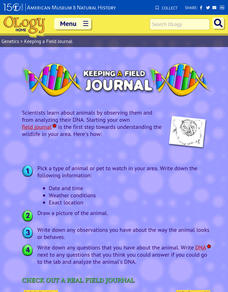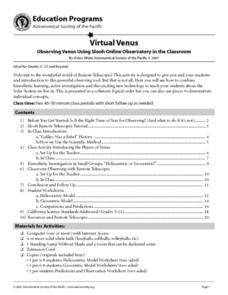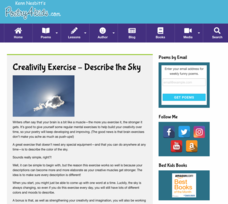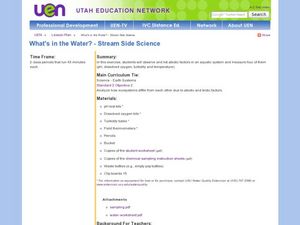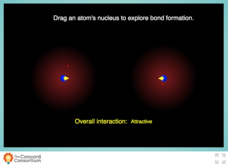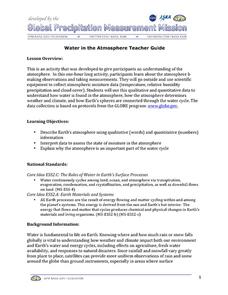Curated OER
A Lesson in Biodiversity: Making Comparisons Between Defensive Mechanisms Utilized by Marine Organisms
If your upper elementary or middle school marine biology learners are going to visit an aquarium, then here is a field trip activity guide for you. It is written specifically for The Maritime Aquarium, but the idea can be adapted to...
Curated OER
Observing the Growth of a Maize Root
Students conduct an experiment in order to observe the typical downward growth of a maize root. They become familiar with the root's growth patterns to use as a control for comparison in other experiments.
Curated OER
Making a Thermometer
Young scholars observe a demonstration of how a thermometer functions. They apply the scientific method while determining which of three cups hold the coldest water. They write a hypothesis before conducting the experiment and gather data.
Curated OER
"Lucky Charms": Interpreting Data and Making Predictions
Seventh graders determine if a "lucky charm" will increase their chances of winning a game. Students calculate the experimental probability of each player in a game. They observe and collect data from each activity. Students compare the...
Curated OER
Observing Root Response After Rotating Plant Ninety Degrees
Students conduct an experiment to observe the response of maize roots when rotated 90 degrees.
Curated OER
Making Sandstone & Conglomerate - An Introduction to Sedimentary Rocks
Students review the three types of rocks and the rock cycle. They participate in an experiment in which they discover the lithification process of sedimentary rocks. They record and share their observations.
Curated OER
Making Gateway Middle School Handicapped Accessible
Students discuss the situation at their middle school about being handicapped accessible. In groups, they identify the various types of handicaps and their accommodations. They create a blueprint of the building and make suggestions in...
Curated OER
Drawing of Animal Of Student's Choice
Students create a drawing of an animal, real or imagined. They develop their artistic skills and work to develop exhibition quality art. After observing magazine pictures, students choose what they will draw. They create a background for...
Curated OER
Making Two-Dimensional Shapes
Which shapes fit? Learners practice visual discrimination using a geometry worksheet, which has them examine shapes that have been divided in half. They observe a set of shapes to determine which of them would fit into each half of the...
Curated OER
Making Two-Dimensional Shapes
Find the shapes that fit. Pupils explore visual discrimination in a set of geometry worksheets, which has them examine shapes that have been divided in half. They observe a set of shapes to determine which of them would fit into each...
Curated OER
Sands of Time
Young scientists take a close looks a samples of sand that come from three different beaches. They use microscopes to view the three slides, and make observations on a worksheet. At the end of the lesson, learners share their...
Center for Learning in Action
Density
Explore the concept of density within states of matter—gases, liquids, and solids—through a group experiment in which young scientists test objects' texture, color, weight, size, and ability to sink or float.
American Museum of Natural History
Keeping a Field Journal
Young scientists begin a field journal by following four steps. A real-world example of an entry showcases the different parts, including location, date, drawings, and more.
Curated OER
Virtual Venus
Students practice using the tool of remote telescopes in order to make observations in space. The lesson includes the best times of year to make observations. They use the internet to obtain information and to initiate the use of the...
Social Media Toolbox
About Facebook
If everyone is on Facebook, should the school's news publication be as well? Scholars study a social media giant in the 11th lesson from The Social Media Toolbox's 16-part series. The activity combines individual study and collaboration...
Poetry4kids
Creativity Exercise - Describe the Sky
Scholars stretch their writing muscles with an exercise that asks them to describe the sky using similes and metaphors.
Education Outside
Honey Tasting
Young scientists will be abuzz as they sample and compare the tasty treats produced by Apis Mellifera.
Curated OER
What's in the Water? - Stream Side Science
Here is a complete activity in which young biologists or ecologists test the pH, dissolved oxygen, turbidity and temperature of stream water. The class visits an actual stream and makes observations of the site. They use scientific...
Curated OER
Solar Car Series: during What Part of the Day Can the Most Sun Power Be Collected?
In preparation for solar car races, middle schoolers attempt to discover what time of day the most solar energy can be collected. Begin by demonstrating the use of a voltmeter for measuring solar cell output. Take them outdoors to take...
Curated OER
Exploration of "Pillbugs"
Fifth graders define vocabulary terms, identify the characteristics of a pillbug, and create a dichotomous key. Then they examine the pillbugs and make observations and record these observations. Finally, 5th graders observe specific...
Curated OER
Dining Out With Fishes and Birds of the Hudson
The class will make observations to determine how environment has shaped the way particular birds and fish eat. They will view a series of photographs, read two short articles, and then consider how food availability has determined how...
Concord Consortium
Forming a Molecule
What does it look like when two atoms bond? Mol-e-COOL! Aspiring chemists observe the interaction between two atoms forming a bond in an easy-to-use interactive. Individuals move atoms closer together and observe changes in attraction...
Curated OER
Water in the Atmosphere
A slide show serves as the backdrop for a lesson plan on the moisture in Earth's atmosphere. Through it, mini meteorologists learn about the attributes of the atmosphere and actually use data-collecting weather tools to make observations...
Howard Hughes Medical Institute
What van Leeuwenhoek Saw
When van Leeuwenhoek saw cells and single-celled organisms for the first time, he knew these small things were a big deal! Share his discoveries with young learners through a narrated video, model-building activity, and scale study....
Other popular searches
- Making Observations Science
- Making Observations Biology
- Ell Making Observations
- Making Observations in Science
- Ell + Making Observations














